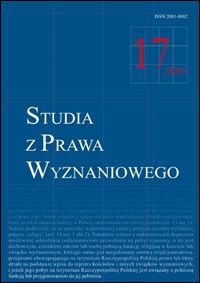Wolność sumienia i wyznania cudzoziemców w prawie polskim
The freedom of conscience and religion of foreigners in Polish law
Author(s): Paweł BoreckiSubject(s): Law, Constitution, Jurisprudence
Published by: Katolicki Uniwersytet Lubelski Jana Pawła II - Wydział Prawa, Prawa Kanonicznego i Administracji
Keywords: freedom of conscience and religion; foreigners; discrimination; concordat; Catholic Church; church - state relations (Poland); the Constitution of the Republic of Poland; law on religion
Summary/Abstract: According to Polish law foreigners do not have fully the same privileges as Polish citizens in the field of freedom of conscience and religion. The Constitution of 1997 allows the limitation of constitutional rights and freedoms of foreigners in comparison with Polish citizens by law. On the other hand, the principle of egalitarianism in the treatment of both groups is expressed in the most important acts of international law concerning the freedom of conscience and religion ratified or signed by Polish authorities. Nevertheless, the best guarantee of equal treatment of foreigners and citizens in the area of that freedom could only be fully provided due to the ratification of Protocol No. 12 to the Convention for the Protection of Human Rights and Fundamental Freedoms of 1950. Moreover, Polish accession to the most vital legal acts protecting the status of stateless persons (from 1954 and 1961) is highly recommended Consequently, the requirement of having native citizenship by Polish bishops provided by the Polish Concordat in 1993 should be assessed critically as the manifestation of the perception of the Catholic Church hierarchy in political terms as well as the discrimination of the Catholic religion. The above mentioned allegations, which can be supplemented with the charges of the breach of the principle of independence and autonomy of the relevant confessions, or even the violation of freedom of conscience and religion of the foreigners, can be put against the provisions of the Polish legislation, which conditions holding managerial functions in some religious associations on having Polish citizenship. There are significant limitations to the system of relations between the State and religious associations. The most far-reaching restriction of the religious freedoms concerning foreigners seems to be the ban on their membership in the Jewish religious communities, and above all, the lack of an opportunity to apply for the registration of a religious association. All of the above mentioned legislative restrictions should be immediately abolished as they do not correspond with the reality of social relations, particularly in an international context. Their maintenance might cause a failure of Polish authorities in case they were sued by the international human rights and freedoms organizations. Additionally, the restrictions of freedom in religious matters concerning foreigners also have objective and non-discriminatory nature, ie. they are the same as the restrictions concerning Polish citizens. In particular, they derive from socio-political condition of contemporary Poland. Unfortunately, our country is still ethnically and religiously homogenical. This factor continuously affects Polish legislation after the year1989.
Journal: Studia z Prawa Wyznaniowego
- Issue Year: 2014
- Issue No: 17
- Page Range: 23-46
- Page Count: 24
- Language: Polish

